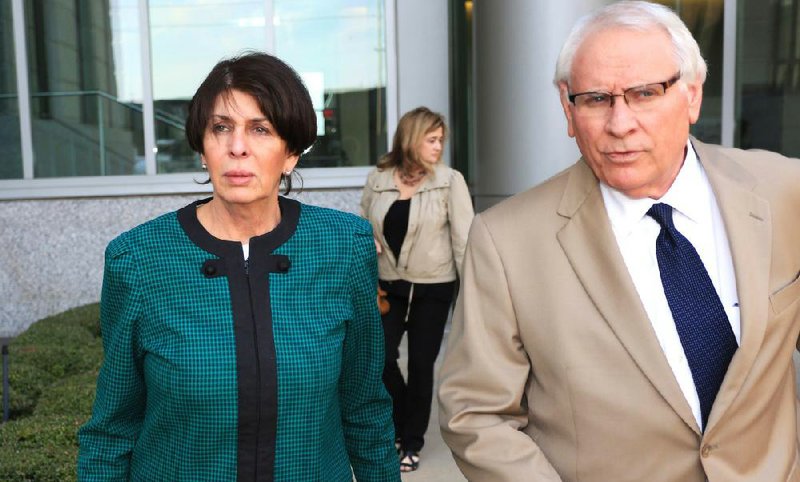U.S. Attorney Chris Thyer unexpectedly asked a judge Tuesday to drop pending mail-fraud charges against former state Treasurer Martha Shoffner, relieving her of a second trial.
"It is a well-received motion," Shoffner's attorney, Charles "Chuck" Banks of Little Rock, said shortly after Thyer filed the midafternoon motion with U.S. District Judge Leon Holmes.
Banks represented Shoffner, of Newport, in a March jury trial in which she was convicted of six counts of extortion, one count of attempted extortion and seven counts of bribery in connection with $36,000 in cash she received from 2010 through the spring of 2013 from a broker, Steele Stephens, who in turn received the lion's share of the state's bond business.
Banks also represented her in a recent attempt to resolve 10 mail-fraud charges that prosecutors had added to her indictment shortly before her trial, which prompted Holmes in February to separate the two sets of allegations into two trials. On Nov. 10, as the Dec. 1 jury trial on the second batch of charges neared, Holmes rejected Shoffner's attempt to plead guilty to a single mail-fraud charge in return for the others being dismissed.
The sticking point was that Shoffner, 70, couldn't agree with all the "elements" of the charge, which included admitting that she had planned to commit the crime in 2009, when she began soliciting money for her re-election campaign. Shoffner agreed that she used about $9,800 in leftover campaign funds in 2010 to pay down a personal credit card, but said she didn't plan to do so a year earlier.
Prosecutors had charged Shoffner with 10 mail-fraud charges, each relating to a separate payment she made on her personal credit card with campaign funds between October 2009 and Oct. 9, 2011. The indictment, however, alleged that the separate payments were part of a scheme, which required proof of planning.
When the plea fell through, a tearful Shoffner told reporters that "I just want to get this over with." Her trial on the mail-fraud charges was rescheduled to begin Feb. 2.
In the motion filed Tuesday, Assistant U.S. Attorney Jana Harris wrote, "The United States anticipated an alternate resolution to the remaining counts that would conserve resources and promote judicial economy, but that resolution was not achieved."
Harris said that in opting to drop the newest charges, her office considered the resources necessary to pursue the second trial, the penalty range Shoffner already faces when sentenced on her 14 convictions, and the "potential impact" on the sentencing range suggested by federal sentencing guidelines if she were convicted on the mail-fraud counts as well.
"The United States has determined that the appropriate course of action is to present evidence of the defendant's conduct," as charged in the mail-fraud counts, at the sentencing hearing on the bribery and extortion charges, the motion said. Under the sentencing guidelines, federal judges are permitted to consider "uncharged conduct" to enhance a sentence for a proven conviction.
In a statement issued shortly after the motion was filed, Thyer said, "As set forth in our motion, we have given this matter considerable and careful thought prior to announcing the decision today. Based on our estimate of the anticipated sentencing guideline range that Ms. Shoffner faces as a result of the March 11 convictions and our expectation that if she was convicted on the mail fraud charges, there would be minimal, if any, impact on the sentencing guideline range, I have determined that the appropriate course for the United States is to dismiss these charges."
Asked what he thought precipitated Thyer's decision, Banks said, "I just think it's the right thing to do by the government, and I think Chris Thyer knows that and is well-principled."
Banks added that in light of the convictions Shoffner already has, "What more was necessary?"
Banks said he called Thyer and "I told him I was very appreciative of his thoughtfulness."
At the time, Banks hadn't yet spoken to Shoffner, who was standing by to talk to him on another phone line, so he couldn't describe her response. But he said, "I think this opens the doorway for us to go forward and get the conviction counts in front of the judge," who he said has the careful nature to "craft a fair and reasonable sentence."
In his statement to reporters, Thyer added, "My determination included careful consideration of the resources necessary to pursue a second trial. What Ms. Shoffner did was wrong on many levels -- not the least of which was the breach of the trust placed in her by the electorate. However, at this time, it is best to move forward with sentencing on the bribery and extortion convictions, and we anticipate presenting evidence related to the mail fraud at that time."
Shoffner faces up to 20 years in prison on the bribery and extortion convictions, though it isn't known what penalty range federal sentencing guidelines will suggest within that statutory maximum.
A pre-sentence report examining Shoffner's life, including any previous good deeds or any mitigating circumstances behind the charges, will include a suggested penalty range that the judge must consider during sentencing, but doesn't have to follow. The pre-sentence report, which will be completed after a comprehensive investigation by the U.S. Probation Department, an arm of the court, is routinely sealed but is usually discussed in part during sentencing hearings.
A section on 11/26/2014


